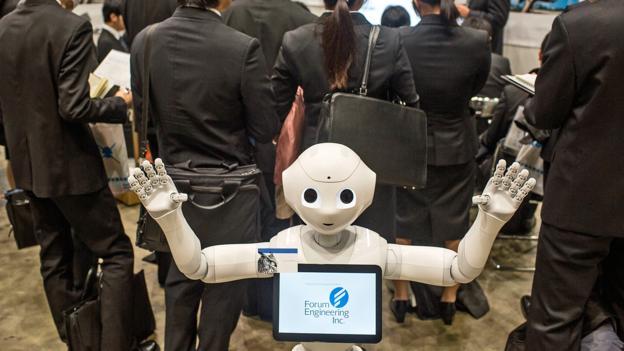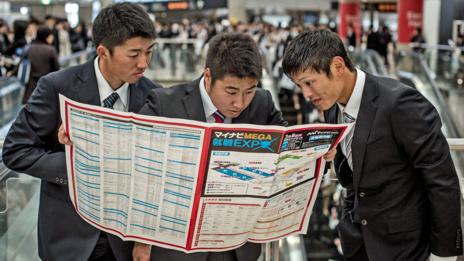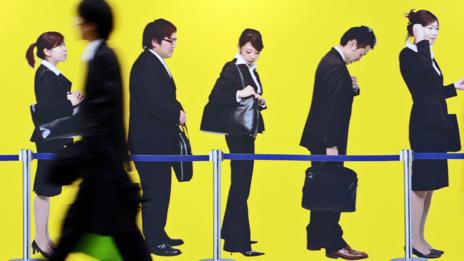Are job fairs making a comeback?

Technology has changed the need for job fairs. (Chris McGrath/Getty)
Have job fairs become obsolete?
Ask most people when they schlepped paper copies of their resume and a stack of personal business cards to an in-person career fair, and it will probably take a while before they remember. In college or university? During the 1990s?
With recruiters now favouring online applications, and sites such as LinkedIn and Xing allowing professionals to develop networks and search jobs ads, it’s easy to think the traditional career fair has become antiquated.
But, depending on the stage of your career, your field and your geographic location, a career fair may be the next place to go for a position. BBC Capital polled a number of experts to get their take on where the in-person career gathering fits in today’s changing employment landscape.
Steven Yeong, recruiter coach at Hof Consulting in Singapore
Alive and well in Asia. Career fairs, especially for candidates fresh out of school, are very popular in many parts of Asia and many entry-level applicants are hired because of them, according to Yeong. At the MBA level, attendees can even land higher-up positions since candidates generally have a few years of experience. India and Japan have some of the most extensive job fair offerings, he said.
Many large institutions, especially banks, have dedicated departments focused on campus recruitment, and one of the channels they use for marketing and promoting of corporate brands is job fairs, according to Yeong. “In fact, some firms take part in job fairs when they don't actually have jobs for fresh graduates, but they still buy a space at top Asian universities just as a means of branding,” he said.

Japan has some of the most extensive job fair offerings. (Credit: Chris McGrath/Getty)
Yeong said he wouldn’t be surprised if virtual job fairs begin to compete with face-to-face career expos in the next few years as they will offer cost savings and may appeal more directly to tech-savvy young graduates.
Anne Hubben, recruiter for creative talent in the New York City area and international career coach
Room for improvement. “[Career fairs are] particularly useful for people who want to improve their interview skills,” said Hubben. “It’s great practice for making adjustments on the fly and staying focused even if the booth is crowded or the interviewer is distracted. You can work on your handshake, eye contact, tone of voice and monitoring your energy level. There's nothing like being "live" to hone your presentation.”
Edward Dallas, emerging markets sector manager at London Business School
Stronger than ever. At the London Business School, Dallas sees a huge demand from both corporations and students for recruitment events on campus. Each term, more than 30 companies attend the school’s recruitment evening.
While companies have expressed interest in virtual presentations for students, in-person events still reign supreme, said Dallas. “Recruiters and students alike tell us that face-to-face interaction at the recruitment fairs is invaluable,” he said. “Actively engaging with companies at physical events gives both the company and the candidate an altogether more interactive experience.”

Are in-person career fairs really worth the time? (Credit: Toru Yamanaka/Getty)
The school supplements recruiting events with a fresh way to introduce students to possible employers, Dallas said. LBS offers 16 “career treks” each year, in which a group of students visits companies in targeted sectors or markets. Those interested in health care, for example, can take a trek to Switzerland, while those interested in technology join the tech sector trek to Silicon Valley, he said.
Jorg Stegemann, managing director of Kennedy Executive Search & Outplacement with offices in France, Germany, the Czech Republic and soon Italy
Not worth it. After attending a job fair in Paris in 2014 with the purpose of attracting candidates and companies to his search firm, Stegemann said he would not be returning to one anytime soon. “Up to 20 candidates were standing in a line waiting for an audience with the recruiters,” he said. But just because the numbers were high didn’t mean that they were the best fit for the position. “It’s similar when placing a job ad,” he said. “95% of all candidates don’t match what you are looking for.”
Social networking has made in-person career events less important, Stegemann said. "Social media has changed the way we network,” he said. “There is an 80% chance that one will find one’s next job through networking.”
Stegemann would much rather see someone connect through LinkedIn than wait in line at a job fair. In-person meetings remain important — just later in the application process. “Unless you shake hands, no classical job can be found and no job contract signed. [It’s just] the way the first contact is established that has changed.”
Anthony Curlo, CEO of New Jersey-based IT recruiting and staff augmentation firm DaVinciTek
Obsolete for information technology. “The job search rules, especially in the IT field, have changed dramatically in recent years,” Curlo said, in an email. “In today’s economy, our clients measure us on time to market. Everything you need to know about an employer, or prospective candidate(s), is available on our clients’ website, or via social media, thus eliminating the need for a career fair altogether.”

Technology has changed the need for job fairs. (Chris McGrath/Getty)
Rather than spend time at a career fair, Curlo suggests becoming adept with LinkedIn. “The truth is most companies will not likely interview a candidate without reviewing their LinkedIn page,” he said.
Davidson Young, Silicon Valley-based career and leadership coach
Come prepared, gain experience. “Most job seekers don’t utilise career fairs correctly. They go to booths without preparation,” Young said. “It’s important to research companies and opportunities ahead of time, use that information to focus your efforts and craft an introduction and questions to make a great first impression.” Always ask for a business card, or connect on the spot using an app like the one LinkedIn offers.
Young recommends students and new graduates start with in-person fairs before trying out virtual ones, since the virtual ones can be “awkward” for students who often “don’t have experience interacting with unfamiliar people in a professional setting,” he said.
Regina Reinhardt, executive career coach based in Switzerland
Still valuable for some. In Switzerland, job fairs remain popular for recent university graduates and foreign professionals seeking jobs, according to Reinhardt. Still, for experienced professionals and local job seekers, recruitment agencies, personal networks, referral marketing and social media tend to be more common.
There is still some variation. “Social media and the internet are used to announce jobs,” she said. However, personal impressions remain more important than in some regions and all pre-selection interviews are done in-person rather than over the phone.
Career Coach is a twice-monthly column on BBC Capital in which we consider the career turning points and questions many professionals face. We welcome questions from readers at careercoach@bbc.com.
Featured Video
From around the BBC
- The best jobs for smart, but lazy peopleBBC CAPITAL
- Naked in front of strangersBBC CULTURE
- The greatest mistranslations everBBC CULTURE
- When the road is your officeBBC CAPITAL
- Run a Tight Ship: What a Former Navy Captain Taught BLCCOMMERCIAL INTEGRATOR
- 3 Illegal Things Your Employer May Be DoingTHE CHEAT SHEET











No comments:
Post a Comment
Please leave a comment-- or suggestions, particularly of topics and places you'd like to see covered